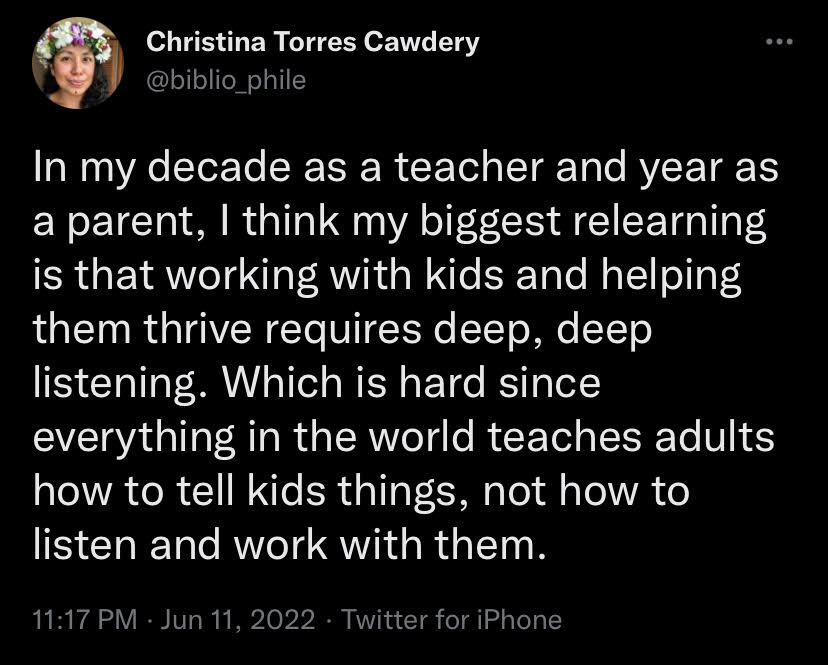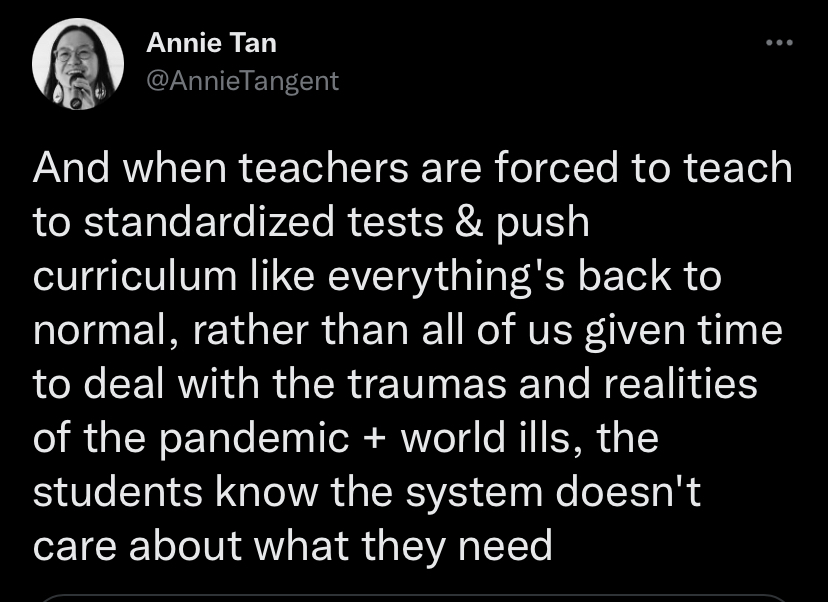Resting and Reflecting: An Invitation to a GMD Community Conversation
By: Sara Rezvi and Janaki Nagarajan
Dear Global Math Department Community,
We begin with acknowledging that this school year has been intense for many math educators in the United States. Some highlights: Florida rejecting math textbooks under the guise of anti ‘critical race theory’, anti-SEL sentiments, and anti-trans legislation bills sweeping states throughout the country with ~ 240 bills being put forth as of March 2022, the tragedy and massacre of 4th grade Latinx children and two educators in Uvalde, TX by an 18 year old man armed with an assault rifle, and the subsequent increased calls for teachers to be armed. While this list is by no means comprehensive, it points to the sheer heaviness teachers in the last year have faced. Teachers (and math teachers in particular) are not a monolith, nor can and should be treated as a universal, homogenized group of people with the same perspectives and politics; however, the structural realities impacting the teaching profession have us reflecting on the culmination of this year.
We wrote this short piece as an invitation to reflect as a community rather than solely centering our own thoughts about our specific educational roles. For context, Janaki is an elementary school teacher in the Seattle area and has been teaching for 3 years. Sara is a former high school math teacher, current program director of the Math Circles of Chicago and a doctoral candidate in math ed.
The end of this tumultuous and heartbreaking year has left us with questions, complicated feelings, tensions, and numbness for the both of us. It has also given us pause to reflect on the subtle moments of joy, serenity, and hope that comes with working with children.
We invite the GMD community to engage in the questions and resources we have included here and to offer additions as well if you so choose as an attempt to reflect beyond this piece and with(in) the community so many of us might need to process this year. We also invite readers to engage in a slowchat using the hashtag #GMDReflects (and tag us @/arsinoepi and @/janaki_aleena) with A# as a response to the questions below [Example: A3: #GMDReflects and tag us]. We hope to engage with you all as we take stock of the realities of this year as a community. We ask folks to communicate in good faith as we intend to do the same.
As an overarching question, we ask folks to consider this as a framework for the remaining questions below, which is, how do we intentionally reflect on our math teaching practice without falling into the trap of white (and white adjacent) saviorism and complicity? How are we intentionally choosing to be ‘key makers and not gatekeepers’ (Marian Dingle, @/DingleTeach) (especially in a field like math that has and continues to be mired in exclusivity?) See: Lorena Escoto German’s “Textured Teaching: A Framework for Culturally Sustaining Practices”
Q1: As writers and educators, what is our role in sharing the stories of others (i.e. when and how should we share, and when shouldn’t we?), knowing the stories will be filtered through our own lenses and biases as the writer, and filtered again through the lenses and biases of the readers?
Q2: Consider the nuanced practice of boundaries in professional-emotional-caretaking settings. How do we establish where I end and you begin? With colleagues? With families? With self? What are the complexities that must be attended to in the emotional labor that is so often required amongst those who have been racialized and gendered into caretaker roles (such as teaching) without losing ourselves in the process? What intentional and productive boundaries do you intend on setting next year? Similarly, how do we recognize and mitigate the impact of emotional labor of marginalized students navigating math classroom spaces? See: Racialized and Gendered Labor in Students’ Responses to Precalculus and Calculus Instruction, Battey, et al, 2022)
Q3: How do we seek to grow, reflect and push ourselves professionally while respecting our own well-being? What role do privileged teachers and students have in centering the well-being of historically marginalized teachers and students? What are some examples or actionable steps your organization or individuals within it took this year towards making this happen? See: Tony Sun’s Thread on Supporting Trans Children (@/poetpedagogue)
Q4: What is the difference between a responsibility and an obligation? How does that show up in mathematics educational spaces in the United States? Is there a difference? What is our responsibility towards the communities and children we have chosen to serve and truly engage in the ‘deep practice of listening’ (paraphrased from Thich Nhat Hanh “From Mindfulness to Heartfulness, p. 49)? This question inspired by Christina Torres Cawdery (@/bibliophile)’s tweet screenshotted with permission below.

Q5: In light of the ongoing alt-right attacks on LGBTQIA+, Black, Indigenous, Asian, and Latinx children, as educators how do we show up to affirm the humanities of the most vulnerable in mathematical spaces? See: Alex Shevrin Venet’s “Equity-Centered Trauma-Informed Education” or Dr. Brandie Waid’s website thequeermathematicsteacher.com.
Q6: Related to the tweet screenshotted with permission from Annie Tan @/AnnieTangent below – How do we teach in ways that center student knowledge and expertise in the midst of standardized curriculum and assessment systems, that prioritize certain types of knowledge and expertise that are born from white supremacy culture? (Tema Okun, Dismantling Racism Works)

Q7: Related to Janaki’s tweet screenshotted below, our final question is where (or to whom) have you looked to for hope and inspiration this year? What helped you grow? Reflect? Expand? (with respect to your math teaching practice). Do you have any book recommendations, podcasts, readings, artwork, music, or any other sources that have kept you afloat this school year? How did it help you?

We hope that in the midst of all the heaviness this year, you are able to find a bit of peace and healing this summer. If these questions resonate with you please chat with us on Twitter using #GMDReflects per the instructions above.
We close this piece with a few lyrics from an old Nirvana song and ask you to come as you are.
As a friend.
As a friend.
Take care and rest well this summer,
Janaki and Sara

